Steve Jobs always had his "one last thing" – the hotly anticipated moment at the end of presentations when he would reveal the latest innovation to Apple's adoring fans. Tim Cook, his lower-wattage successor, has "only Apple" – a refrain he has used so many times it has been turned into a song by YouTube artist iTunedSteveJobs. "Only Apple could make such amazing products," sings Cook. "Only Apple could make such amazing hardware."
There'll be more of the same on Tuesday at the Flint Centre for Performing Arts in Cupertino, California. The expected unveiling of at least one new iPhone with a much-trailed larger screen is likely to be the largest launch in the company's history and the most important speech of Cook's career so far.
Leaks from suppliers suggest the company wants to have 70m-80m of the new devices in circulation by the end of the year. The company may also unveil the smartwatch it has been working on – the first truly new product of the Cook era – and make an announcement about its new health-based tracking system, HealthKit, and payments via its devices.
Just over three years in as chief executive, Cook has Apple financially firing on all guns. But critics, as ever, worry that the company is running out of ideas in a post-Jobs world, and headlines in the runup to the event have not been exactly helpful.
Last week Apple's systems were widely blamed for the leak of intimate private pictures of celebrities including Jennifer Lawrence and Kirsten Dunst. "Thank you iCloud," tweeted Dunst. Apple has moved quickly to tighten up security for the cloud, but with major announcements expected about plans in health and money, where privacy is vital, the scandal was highly embarrassing.
If anyone can understand how the stars felt, it's Cook. The early life of a man often described as deeply private will no doubt one day make a fascinating read, although to date he has been reluctant to give much detail. Born in Mobile, Alabama in 1960 to a shipyard worker and a pharmacist mother, he grew up in the battleground of the civil rights movement.
He has spoken about the impact it had on him. "Growing up in Alabama in the 1960s I saw the devastating impact of discrimination. Remarkable people were denied opportunity and were treated without basic human dignity solely because of the colour of their skin," he said in probably his most intimate public speech so far: last year at the United Nations, organised by Alabama's Auburn University, his alma mater.
Not far from where he lived, he recalled, he once saw a cross burning outside the home of one such "remarkable family". "Since these early days, I have seen and have experienced many types of discrimination and all of them were rooted in the fear of people that were different than the majority," he added, without giving any further detail. It was hard not to see an allusion to his own sexuality: Cook is the most powerful and prominent gay man in business.
Cook regularly tops polls of the most powerful LGBT figures in the world and, as you'd expect, never really talks about it. He has championed diversity at Apple – a move that comes as its tech peers are all at pains to stress they want to diversify away from their mainly white, male and straight roots to better reflect the world around them.
Apple's diversity report suggests it is slightly less dominated by white straight men than Google, Facebook et al – but only ever so slightly. Its definition of diversity is also broader and includes sexual orientation, veteran status and disabilities.
The truth about Cook's reticence may be partly that he has little time for a private life – the 53-year-old is work-obsessed almost to the point of being clinically workaholic. Haunted Empire, Yukari Iwatani Kane's book on post-Jobs Apple, paints a portrait of a man who rises at 4.30am, gets an hour in at the gym and is at his desk by six. He lives on energy bars and Gatorade when not dining simply on chicken and rice. He will "fly to Asia, spend three days there, fly back, land at 7am at the airport and be in the office by 8.30am, interrogating someone about some numbers," she writes.
If Jobs put the fear of God into people by shouting, Cook prefers awkward silence. "Sometimes he would take an energy bar from his pocket while he waited for an answer, and the hush would be broken only by the crackling of the wrapper," she writes.
Hard work and a focus on diversity are both nice, but they are not how Cook will ultimately be judged. Those calculations will be about units sold and money made. So far he seems to be doing a pretty good job.
Cook was appointed by Jobs in 1998 when he was a 37-year-old supply chain manager at PC maker Compaq. "I knew what I wanted, and I met Tim, and he wanted the same thing. So we started to work together, and before long I trusted him to know exactly what to do. He had the same vision I did, and we could interact at a high strategic level, and I could just forget about a lot of things unless he came and pinged me," Jobs told Walter Isaacson for his definitive biography of the tech pioneer.
Apple had a reputation for design flair coupled with back-office mayhem before Cook. A truly world-class operations manager, he helped make it the behemoth it is today. He has called himself the "Attila the Hun of inventory". With him alongside his hero and mentor, Apple has been transformed from a struggling company not far from bankruptcy to the most valuable one on the US stock market, valued at $596bn (£365bn). Last year it generated $171bn in revenue and $37bn in profit.
But is the Attila of the back office enough to keep Apple out front? Michael Cusumano, a Sloan School of Management professor at MIT, has his doubts. Cusumano and David Yoffie of Harvard Business School have been studying Apple, past and present, as they put the finishing touches to their book, Strategy Rules, to be published next spring. The book examines what happens to companies after they lose talismanic leaders, focusing on Microsoft's Bill Gates, Intel's Andy Grove and of course Jobs.
In all three cases, they argue, the companies lost their way after leaders left. In Microsoft and Intel's case they have never fully recovered, says Cusumano. He is critical of Apple under Cook but adds it is too early to say whether the company will follow the same path.
"It's fair to say that Apple is going through a transition period. They have to organise product development in a different way, the way they think about strategic positions. Things are becoming much more systematic under Tim Cook and in many ways that's a good thing. There was certainly a lot of chaos under Jobs. But it was a creative chaos. It was the type of atmosphere where Steve pushed people to outperform even their highest expectations," he says.
Jobs wasn't the company's only talent, or the only one to spot future trends, but he was the one with the ability to "curate, to select and synthesize and push in a way that I think is impossible to replicate," says Cusumano.
Cook has never suggested he has a similar talent. Instead he is relying on the proven ability of people like Apple's design guru, Sir Jonathan Ive. He has also brought in new talent, including music-industry shakers and dealmakers Dr Dre and Jimmy Iovine, who came with his $3bn purchase of music company Beats, and the appointment of Angela Ahrendts, former boss of Burberry, to head Apple's retail empire.
Cusumano doubts the team strategy will lead to an Apple that is as innovative as it was under Jobs – and for a company that has, until now, based itself on creating breakthrough, category-defining products, that's a problem.
"There's no reason Apple can't be an extraordinarily successful company but it will be a different one," he says. The danger for Apple is that without those innovations it will become the next Sony, he believes. The Japanese giant was once synonymous with innovation but "they kept missing major technological changes". Sony remains a mighty entity but it no longer defines the landscape.
One of the risks he identifies is Apple's closed system. Tight control of its operating system and who can use it gives greater control over the look and experience of its products and allows it to charge premium prices. As Google's competing Android mobile system reaches ever better, and cheaper, iPhone rivals, he argues that "commoditisation" will present Apple with a major threat unless it can once again carve out a new market with a new product.
Cook has said he wants to make Apple more open. "I think you will see us open up more in the future," he told a tech conference last year. "But not to the degree that we put the customer at risk of having a bad experience."
For Apple, and its fans, that degree of control is one of the things that makes Apple special. Apple's software, devices and services like iTunes and iCloud are their own universe, creating a virtuous circle out of a closed(ish) system.
It is a feature that drew one of Cook's "only Apple" lines. "We do this so that we can create a seamless experience for our users that is unparalleled in the industry. This is something only Apple can do. You've seen a few people on stage this morning, but there are thousands of people that made today possible," he told Apple's World Wide Developers Conference (WWDC) in June.
John Gruber, author of the Daring Fireball blog and one of Apple's most astute analysts, agrees – to a degree. "Is this true, though? Is Apple the only company that can do this? I think it's inarguable that they're the only company that is doing it, but Cook is saying they're the only company that can," he wrote not long after the WWDC speech.
Rivals Microsoft and Google might be close to doing what Apple does; Amazon and Samsung less so. But Apple is already there – and, Gruber argues, its enormous scale has created an opportunity for the company to escape the commoditisation that would destroy today's premium iPhone with tomorrow's cut-price copy.
"Apple's commitment to making its own hardware provided necessary distinction while the company was relatively small. Now that the company is huge, it still provides them with distinction, but now also an enormous competitive edge that cannot be copied. You can copy Apple's strategy, but you can't copy their scale," writes Gruber.
When it comes to running scale, who better than Cook? Now all he needs is "one last thing".
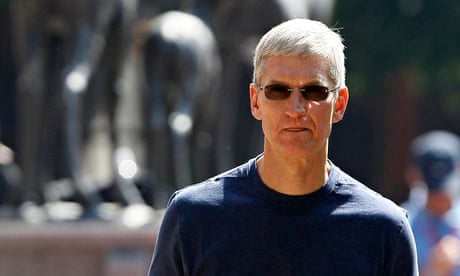
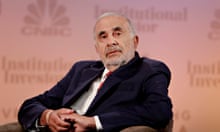

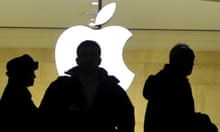
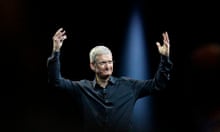
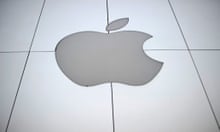
Comments (…)
Sign in or create your Guardian account to join the discussion